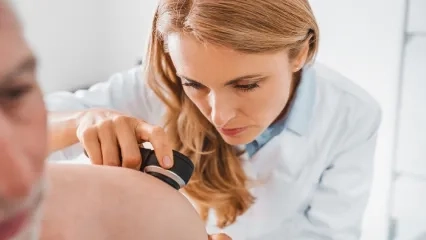Alo Yeditepe
Alo Yeditepe
How to Protect Yourself from Sunburn?
Do you know what precautions you should take against sunburns that cause spots on the skin, premature aging, and most importantly, increase the risk of skin cancer? Skin and Venereal Diseases Specialist Asst. Prof. Dr. Özlem Akın talks about ways to protect from sunburns.
Do Not Go Out in the Sun at Risky Hours
First of all, the most important measure that can be taken is to protect ourselves from the sun. For this reason, care should be taken not to go out in the sun between 10:00-16:00 when UV rays are the strongest. However, it should be protected throughout the year, not only in summer and on sunny days, but also in cloudy weather. In addition, it should be used not only under the sun, but also in the shade when going out.
Do Not Go Out Without Your Hat and Sunglasses
Clothes to be used for protection from UV rays are also important. If you are going to go out in the sun, long-sleeved shirts made of tightly textured fabrics, beach clothes, and long pants and skirts should be preferred. The color preferences in the clothes should also be light colors.
The hat should be one of the accessories to be used. The preferred hat face should shade the ears and the back of the neck to provide protection. Dark-colored and straw hats should not be preferred.
UV-protected sunglasses are also indispensable accessories in summer. Glasses that completely cover the eyes will protect the eyes against the effects of the sun.
Choose by Protection Factor, Not the Brand
At least half an hour before prolonged outdoor activities, water-resistant, broad-spectrum sunscreen with at least 30 protection factors should be applied to all areas other than clothing. The application should be renewed every two hours or immediately after swimming or sweating.
Decide on the Type of Sun Protection
Chemical filters are chemical molecules that absorb the skin's UV rays. It provides very effective protection against UV rays. Mineral filters sit on the surface of the skin to mirror the sun's rays. It is also known as a physical sunscreen. Physical filter-containing preservatives should be preferred in children, pregnant women, and people prone to allergies.
Apply Sunscreen Half an Hour Before Going Out in the Sun
It is important to apply sunscreens with the right factor to all exposed skin in a thick layer. Since the sunscreen is worn, it should be applied 15 minutes before going out in the sun. It should also be repeated after 2 hours in the sun.
Beware of Fluorescent Lamps
It should not be forgotten that solarium devices can also cause skin cancer like natural sunlight.
Tips for Home Treatment of Sunburns
Drink plenty of water: Take care of water consumption to prevent dehydration that may occur after sunburns. Water will be beneficial in maintaining the moisture of the skin.
Try to cool your skin: One of the effective methods of treatment will be to cool the skin, as inflammation occurs on the skin that is affected by the sun and burns. For this, apply a clean damp towel to your skin. Do not apply ice directly. It will also be beneficial to bathe with water as close to cold as possible during the day.
Do not go out in the sun: Avoid the sun during the treatment of burns. If you need to go outside, wear appropriate clothes.
Choose loose-fitting clothing: Make sure to choose loose-fitting clothing made of natural fabrics such as cotton to allow the skin to breathe as it heals. Do not use burnt clothing.
Use moisturizer: It needs good care in the process of treating the burn and repairing the skin itself. In this process, it is necessary to use regular moisturizers at the beginning of what needs to be done to prevent skin peeling. Regularly use moisturizers suitable for sensitive skin to prevent irritation to affected areas.
What are the Wrong Practices in Sunburn?
Entering the pool: Because of its chlorine content, it will cause more damage to the skin, so you should not swim in the pool to cool down.
Popping Burn blisters: Blasting blisters on the skin due to burns is one of the things that should not be done. If this happens unintentionally, it should be cleaned with soap and water. Then the antibiotic ointment should be applied and closed by bandaging.
Using irritating creams: Do not use products that contain caine (such as benzocaine) that may irritate your skin or cause an allergic reaction after sunburns.
What to Do After the Sunburn Heals?
Sunscreens should continue to be used as frequently and properly as possible. People with a history of recurrent sunburn should be under the control of a dermatologist for the risk of developing skin cancer.
Do Sunscreens Cause Vitamin D Deficiency?
It is unclear whether sunscreens cause vitamin D deficiency. In addition to the fact that there is no consensus in the studies conducted, there are patients whose serum vitamin D levels decrease with the use of sunscreens, as well as patients who provide adequate vitamin D levels for the body despite being strictly protected from the sun.
About
Faculty and Year of Graduation:
Marmara University Medical Faculty, 1998
”
See Also
- Does Sunburn Cause Skin Cancer?
- How Often Should You Take a Shower?
- Sunburns Can Leave Permanent Damage
- Causes of Hair Loss
- Itching can be a Symptom of Another Disease
- Scabies Disease
- Ehlers-Danlos Syndrome
- Do Not Underestimate Itching!
- Intense Stress Makes Hair Ringworm
- Urticaria Decreases the Quality of Life
- Pollen is Now Seen Outside of Seasonal Changes
- How Should We Protect Our Skin During the Summer Season?
- 15 Ways to Protect Skin During Winter
- Skin Microbiota May Affect Immunity!
- Acne and Diet
- Sunburn
Alo Yeditepe





